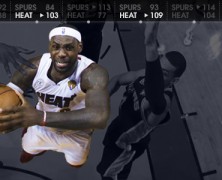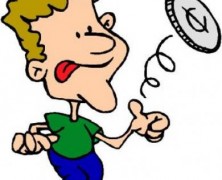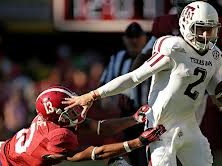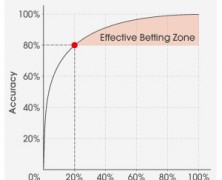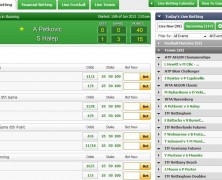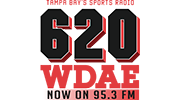I had the privilege of attending the Macrosports Conference over the weekend and came away with some very interesting conclusions that can (and should) be applied to all sports betting. I figured the title of this article would lead readers to think I planned to delve into the age old adage about the best bettors not having favorite teams; eliminating sentimentality and fan bias from the equation entirely. While those of you that have read my work know that to be my mantra, it’s far from the focal point of this piece. Instead, remaining objective in this context applies to how we analyze data or choose to observe a series of events. The key note speaker for Sunday’s conference was Nate Silver. While Nate’s best known for his predictive political models, the concepts he applies in that arena can readily be adapted to sports betting as well. When the end goal is building an objective model, the architect shouldn’t approach the situation searching only for data to support his initial hypothesis. There’s a surplus of information right at our fingertips and it’s easy to seek out the desired result if you’re hand selecting information. This concept resonates with every gambler who watches games always believing he/she had the right side. Whether it’s a fumble, ticky tack foul, or a blown call casual bettors can’t see past their vested interest to gain the useful takeaways from a game that will make them money in the future. If bettors don’t remain objective when analyzing the data points, they’re bound to make the same mistake with that exact same team again. When viewed through a specific lens, our analysis is inevitably shaped to support preconceived notions. The easiest way to illustrate this concept in sports handicapping is...
Retrospective Analysis...
posted by Todd
After a pulsating 2013 NBA Finals series between the Heat and Spurs, in an exclusive inside look, Pinnacle Sports’ lead NBA trader takes an in-depth look back at the odds movement over the seven games and explains what may have influenced them, essential insight for any NBA bettor. Desperation a key factor in odds movement One of the key factors affecting the spread in the NBA Finals was the level of desperation of a team, rather than a perceived momentum for the team that had previously won. A key factor affecting the spread was desperation. This was strongly demonstrated before Game 4, when Miami were in a desperate situation (2-1 down, playing in San Antonio and set to stay there for Game 5). The Heat needed to win, and coupled with their small perceived skill advantage over the Spurs, were set as 1-point favourites. Had Miami been in less of a desperate position, a different handicap could have been set. The exception to this “desperation” advantage was in Game 5, where despite having evened the series, Miami were roughly the same 1-point favourite as they were going into the need-to-win Game 4. In fact, if desperation were to favour anyone, it would be the Spurs, as Game 5 was their last shot at home. Instead, having leveled the series, public confidence in Miami’s Big Three – Lebron James, Chris Bosh and Dwayne Wade – may have returned to shape that market. Click here to read full article Todd’s Take: Understanding where an oddsmaker is coming from when he sets a number is of huge value to bettors. Everyone quantifies factors differently from the very real impacts of home court to the more intangible factors like desperation and motivation. This is where the best handicappers...
Tailing Twitter
posted by Todd
We’ve all been in a pinch before, trying to cut corners for winning a bet when time was of the essence. During the 90’s we turned to posting forums for that information whereas now we lean on twitter to make ourselves a quick buck. You see it all the time, followers jump from hot hand to hot hand aiming to find the never ending winning streak leading to endless envelope collection. However, there is no shortcut to winning and it’s definitely not this simple. Recognizing talent with a proven track record of winning takes attention to detail, especially in an environment like twitter where putting up a website, fabricating a record, and posting BS information can easily mislead the masses. Just like handicapping games yourself, finding someone to follow for information (free or otherwise) takes due diligence especially when your bankroll is on the line. Here are a few do’s and don’ts when looking for someone to lead you to the promised land. Do: Follow a handicapper for an adequate stretch of time before actually betting his or her information blindly. Anyone can get hot for days, weeks, or even a month but how do they respond when things start going south? Handling losses is a big part of winning long term so until you see someone respond to adversity be cautious. Remember the best entry point to tail is when a proven capper has hit rock bottom rather than when he’s in the middle of a 12 game win streak. Don’t: Jump from handicapper to handicapper trying to capitalize on multiple hot streaks. No one is omniscient, normally by the time you find a new “emerging” capper he’s at the tail end of his streak. The last thing you want to do is be...
Trading Places
posted by Todd
I’m sure those of you in the US are delighted that betting in-play is gradually being introduced, as slow a process as it is, and as far behind in the delivery and options that are available in Europe. When bet in-play got off the ground in the UK 15 years ago the options were very limited but the sky now appears to be the limit. By Jay Jarrahi For an NFL match for instance you simply had the option to bet the game at half-time with a readjusted line (money line and handicap) that was set off the pre-match line. It provided a brief opportunity to hedge a pre-match selection or get involved in the game for the first and last time. Over the 15 year period since then, rival companies have been in competition with each other to offer more and more games to bet on because they see opportunity in every sport. If a race is being run or a ball is being hit anywhere in the world, you can be sure that at least one betting company in the UK is trading it live. The demands on traders have increased dramatically, particularly in the case of soccer and tennis. When I started trading for a book my usual shift consisted of trading three soccer matches one after the other with decent sized breaks in between each game – (aside from half-time) and I always had access to live pictures for the game. In a matter of a few years those demands turned into up to twelve soccer matches a day or as many as seven to nine tennis matches during busy tournaments. Tennis events die down as the week progresses and tournament fields get whittled down but soccer is a never...
10 Ways to Stick out in a Sportsbook...
posted by Todd
We’ve all seen them before; gamblers accustomed to betting their games online that aren’t quite ready for the bright lights of the sportsbook. That’s more than ok, it’s a learning experience for every novice their first time and the only way to become a seasoned betting veteran is with experience. Ask questions of the patrons around you, observe others behavior, and think before you make a final decision. However, there are some sure fire behaviors to avoid if you simply want to blend into the crowd instead of making yourself look like a jackass. That’s what I’m here for, to offer that sage advice. (Have your own ideas for behaviors people should avoid in the book? Send them here and we’ll update the list) Cheering at non critical junctures like the game depends on it. Let’s not kid ourselves, every basket in the 1st quarter of a NBA game nor hit in the first inning of a baseball game warrants excessive jubilation. Enjoy a cocktail, save the excitement for when it matters most. Acting exasperated when expecting the ticket writer to know exactly what you mean when you ask ridiculous questions. This will get you dirty looks every time from the lifetime sportsbook employee. Try to have 1 or 2 short concise questions the staff can help you with in a timely manner, not a laundry list of requests. Just a quick word of advice: asking about “if” bets, reverses, or the infamous 1 team teaser will only draw the ire from seasoned staffers Treating the cocktail waitress like she’s your personal butler. The women that call cocktailing a career are there to serve your drinks, not clean up your personal space. Make sure you tip them well for each round (even if you...
Don’t Trust your Gut...
posted by Todd
Gamblers frequently bet on a feeling or gut instinct. Unfortunately your gut is far more irrational than you might think, utilizing ready made rules of thumb – known in psychology as heuristics – which can be unsuitable tools for successful betting. There is a very good reason we rely on heuristics – evolution. Our distant ancestors when faced with complex life-threatening problems didn’t have time to weigh up the situation, so developed quick-fire methods. Those that worked were passed down through generations, and we are still relying on them, often when we shouldn’t. Click here for full article Todd’s Take: First things first; if you’re not making this a regular stop on your daily journey to understand sports betting, you’re selling yourself short. Pinnacle has taken the forward thinking approach towards sports wagering turning it into a thinking man’s game, offering insightful articles about not only their bookmaking philosophies but other relevant industry topics daily. The article here discusses a lot of the concepts we accept as gambling doctrine, specifically the notion of trusting your gut over what the numbers tell you. Concepts like anchoring, availability bias, and gambler’s fallacy all negatively impact our ability to process betting information because our brains are conditioned to remember what they want. We selectively recall certain aspects of games we’ve watched even though those moments probably aren’t indicative of the full body of work. More often these tendencies aren’t consistent with becoming a long term profitable sports bettor. One of the sharpest sports investors I interact with daily makes it a point to tell me if he ever trusted his gut he’d have been on the fast track to the poor house years ago. Your major takeaway in all of this is to recognize your own per-disposed biases. ...
Establishing a Win Total...
posted by Todd
Yesterday I went into great detail about how to interpret juice on a win total and exactly what it inferred regarding a bookmaker’s stance on a particular team. My focus here is to share more of an insight into the thought process for how I went about setting a baseline win total to establish a number I felt comfortable having gamblers bet into for each team. First things first, it goes without saying schedule analysis in college football is the starting point for every win total. No matter how good or bad a team appears to be going into the season, if they play nothing but cupcakes compared to power programs it will get reflected in their totals. I ascribe a win probability to each game on a team’s schedule allowing me to establish an overall “number” for each team. It’s important to realize these are only baseline numbers for each side, adjustments are always required based on individual power numbers, public perception, and realistic season expectation. The best numbers in the market aren’t the result of one oddsmaker’s work but rather should be a compilation from an established team (unfortunately this doesn’t happen the way it should). For example here is what my win probability chart looks like for Texas A&M in 2013 Texas A&M Date Opponent Win % 31-Aug Rice 100 7-Sep Sam Houston 100 14-Sep Alabama 35 21-Sep SMU 100 28-Sep @Arkansas 80 12-Oct @Ole Miss 60 19-Oct Auburn 85 26-Oct Vanderbilt 85 2-Nov UTEP 100 9-Nov Mississippi St 85 23-Nov @LSU 50 30-Nov @Missouri 80 Total 960 Notice that the final number is 960, simply translated to 9.6 as a baseline number. Further digging into their schedule reveals that Texas A&M will only be dogs 2 (maybe 3 absolute max) at most this...
Win Totals: Cracking the Juice...
posted by Todd
There’s no way around it; win totals are a major topic of discussion among bettors and sports media members. During the dog days of summer we long for toe to meet leather signifying the start of football season. From the moment the Superbowl ends, football bettors seek milestones; win totals provide the light at the end of the tunnel. Anything to grab onto as tangible proof football season is right around the corner. However this article isn’t about the surge in popularity of win totals but rather to help explain how to read into the lines and understand what the sportsbook’s numbers are telling you. Yesterday marked the release date for a number of win totals from 5Dimes for the upcoming season. Mixed in the batch were high profile programs like Alabama and Notre Dame but also the likes of Indiana and Central Florida (save your breath Hoosier trolls). Given that 5Dimes were first to market, their oddsmakers elected to employ .40 cent lines on each win total. What do I mean when I say .40 cent lines? When I use the term .40 cent line that explains the differential between the price you’d need to lay to back the favorite compared with the price you could take when supporting the underdog. Plain and simple; larger the differential between a favorite and underdog, the higher the hold for the house making it disadvantageous for bettors. To put it in perspective, the most competitive shops booking baseball use a .10 cent line (-115/+105) making it the lowest hold sport of any major market. Below is a chart to help explain the juice generally accepted within the industry for betting each sport. If your shop doesn’t offer these prices (or something similar), begin exploring other betting...
Maximizing Results
posted by Todd
The Pareto Principle states that 80% of outcomes come from 20% of causes. For example, 80% of supermarket revenue may come from 20% of the product lines. The idea is attributed to Italian Vilfredo Pareto, who in 1906 observed that 80% of the land in Italy was owned by 20% of the population. The ubiquitous nature of 80/20 “Power Laws” (as they are known) even spreads to our personal lives. Try looking at likes on your Facebook posts (if you have an account). You should notice that close to 80% of your likes come from around 20% of your friends, or 80% of your mobile SMS messages come from 20% of your phone contacts. There is nothing intrinsically special about these relative proportions; it just happens that they describe the relationships across many dimensions, including accurately predicting bets. The issue for bettors is that to be better than the 80%, you need to put in considerably more effort. Figure 1 simplifies the process of trying to become a more successful bettor as the relationship between accuracy of selections and the effort invested in making them. Click here to read full article Todd’s Take: Work smarter, not harder. It’s a mantra all of us should live by no matter our career or hobby pursuits. By allocating your time correctly while handicapping you can achieve better results than 80% of bettors out there with 20% of the workd. One of the biggest ways to do so is thinking like a bettor AND a bookmaker. Understand the markets that give you an edge, know which are competitive for the player whereas others are built to benefit the house. Give yourself multiple betting outlets to shop your numbers, never leaving yourself forced to take the worst of the...
Bettors Bonanza
posted by Todd
Every now and again we read something that inspires us to action. Some of us donate to a cause, others call a friend, whereas I choose to relate everything to gambling. A buddy sent me this article from Grantland.com that appeared on their site in late May and I knew it was going to lead somewhere, I just didn’t know how I could put it to use at the time. Last week inspiration struck along with a few adult beverages and depending how you feel about my writing you’re either fortunate for the final creation or cursing my name for wasting your time. Regardless, we all know sports bettors and 100% of them fall into one of these categories. If you fall into 8 of them yourself, you definitely might have a problem. Action Junkie/Weekend Warrior Action junkies are glued to the TV, watching every game in its entirety when money’s in play. They’re not worried about getting the best of the number or finding games that give them the best chance to win; nope all they’re worried about is the time slot. Visualize your neighborhood bar on the weekend and the group yelling at the TV during a Browns/Jaguars game, that’s a weekend warrior. Apologist This sports bettor is one who has grown so accustomed to apologizing for being a bettor it’s become part of his identity. We’ve all been with this guy before; he spends more time hiding his betting from his girlfriend, wife, and boss that he’s simply exhausted when it comes time to handicap. Yes, gambling in most locales is technically illegal but he’s really bought into the taboo that surrounds his favorite past time. Serious Investor This is the guy on the list you don’t want to watch games...
Inside Out
posted by Todd
There’s a common misconception amongst bettors – particularly in the UK – that those who work inside the industry as odds compilers or in-play traders don’t understand the frustrations when trying to place bets themselves. I’ve always found that suggestion quite strange since many people inside the industry make (or at least try to) a supplemental living through their own wagers with rival companies. The barriers and restrictions that sharp betting minds encounter with bookmakers are the same as those enforced on those in the industry playing the other side of the fence. I’m not sure how this idea has been cultivated that people inside the industry are forced to take a side either as a bettor or a bookmaker when the exact opposite is true. Both bookmakers and bettors strive to perfect a very similar skillset Written by Jay Jarrahi (@JayJarrahi) Being the book is the easy part: Bookmakers price to margins that immediately give the book an edge over the average bettor because the bettor is simply not informed or skilled enough to beat the book over the long haul. The average bettor doesn’t know or care what percentage book he/she is backing against and is unlikely to know the math behind the positions they’ve supported, the margin they are up against, or the assessment of what they feel the true percentage chance should be for what they’ve bet. They’re simply having a bet for “the fun of it” or because it’s the World Cup or the NBA Finals or the Super Bowl or Wimbledon and they “always” have a bet that time of year. Losing money is a betting tradition for the average bettor and as touched upon in last week’s column, is why bookmakers will always thrive and exist. Having played both...
Where’s Your Edge?...
posted by Todd
It’s a commonly known statistic that 98% of those who gamble – be it consistently or infrequently – end up with less money than they started with. The remaining 2% are your professionals. There are many aspects that separate the professionals from the rest of the pack but the key factor is an edge. Without an edge you can’t succeed in the gambling industry long term. And any success you may have experienced short term without gaining a true edge will only fool you into believing your inevitable decline will be short lived. Written by Jay Jarrahi (Follow him on twitter @JayJarrahi) Bookmakers revel in bettors who are not price or line sensitive and that stream of ill-informed money is why bookmakers will always make multi-million dollar (or pound in my case) profits. If you’re reading this article and you’re someone who backs a team or player because you “think” they or he/she will win – you’re on the wrong track. Professionals aren’t in the business of fortune telling. We all have views and opinions on how any number of tournaments or matches might play out, but that’s not what a professional is betting in attempts to make a living. A professional sports bettor or sports trader is no different from a stock trader; they just happen to deal in sports and not other aspects of business and industry. The aim is always to find value, buying at the right price or the right line, and in some instances selling that price or line when the market moves, be it from an influx of money or due to further developments in the tournament or match they have financially entered into. WHAT IS AN EDGE? The simplest way to define an edge in betting...


